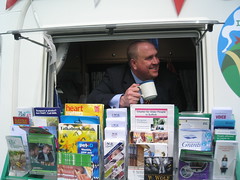Looking at things differently.
17/11/2014 Leave a comment
 Last Wednesday evening I drove to Birmingham for what’s now my forth time working with the Leadership Centre for Local Government as it delivers its programme with Public Health England for Public Health professional working in Local Government entitled: ‘Public Health, Politics & People – Perspectives & Power in the System’. Facilitating the workshop sessions were Chris Lawrence-Pietroni who has co-designed the course and Liz Goold who I was working with for the first time. Also for the first time Cllr. Jonathan McShane from Hackney who is Cabinet member for Adult Care joined, myself and Cllr. Roz Gladden, Cabinet Member for Health and Adult Care at Liverpool Council, whom I have worked with on each of the previous days we have delivered the workshop as a team of Councillors from different backgrounds and political Parties.
Last Wednesday evening I drove to Birmingham for what’s now my forth time working with the Leadership Centre for Local Government as it delivers its programme with Public Health England for Public Health professional working in Local Government entitled: ‘Public Health, Politics & People – Perspectives & Power in the System’. Facilitating the workshop sessions were Chris Lawrence-Pietroni who has co-designed the course and Liz Goold who I was working with for the first time. Also for the first time Cllr. Jonathan McShane from Hackney who is Cabinet member for Adult Care joined, myself and Cllr. Roz Gladden, Cabinet Member for Health and Adult Care at Liverpool Council, whom I have worked with on each of the previous days we have delivered the workshop as a team of Councillors from different backgrounds and political Parties.
Whilst Chris and his team refine the programme a little each time and change it around a bit based on the positions and experience of the participants, doing something for the 4th time is quite unusual for Councillors. Usually a paper or policy percolates through the system and you work out how to present it and you do to once, occasionally twice, at say a Cabinet meeting and then Full Council but mostly it’s a one off speech/round of media interviews etc. Thus it presents an opportunity to refine what you say and reflect on the differences of each cohort.
In the few months the programme has been up and running whilst every group is different both in terms of where they are in the hierarchy of public health teams now a part of local government there has in that time been an interesting shift in the conversations and I suspect thinking as the place of Public Health in local Government is rapidly maturing. Equally as you become more skilled at the delivery of the programme you start to develop what you are trying to stress in the sessions and the differences and similarities of Councillors from across the political divide that you are trying to explore. For me one of the mantra’s I’ve tried to stress is that if you meet one politician you’ve met one politician – for we are all different. In some ways defined by our political party allegiances and in others most defiantly not.
The great thing about this work is that I personally get as much out of it as the participants for it really stretches your own thinking about the Council you belong to and not so much the Public Health teams, more the mind set of officers and how they view their roles and the careers they have chosen.
